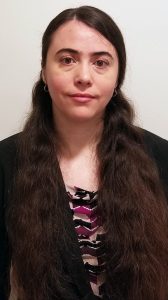Ana Pavel has joined the biomedical engineering faculty at the University of Mississippi, and is the first faculty hire for the department’s bioinformatics emphasis.
A native of Bucharest, Romania, Pavel earned her Ph.D. in bioinformatics from Boston University in 2017. She holds a second Ph.D. in systems engineering from Politehnica University of Bucharest. Pavel earned two bachelor degrees, one in computer science from Politehnica and one in biochemistry from the University of Bucharest.
“I joined the Ph.D. program in bioinformatics at BU as I was fascinated by this field, and BU’s program was the first of its kind and one of the best in the world,” said the new assistant professor of biomedical engineering. “One of my most fulfilling professional achievements was when I received the Dean’s Fellowship from Boston University for first-year Ph.D. research in the bioinformatics program.”
Pavel also completed a postdoctoral fellowship in the Laboratory of Inflammatory Skin Diseases at Icahn School of Medicine at Mount Sinai, New York, where she worked on elucidating how immunity works in inflammatory skin diseases. Her research interests are bioinformatics, machine learning, systems biology, developing new ways to integrate genomic and clinical data to ease drug discovery and repurposing for autoimmune diseases and cancer.
Pavel is a welcome addition to the department, said Dwight Waddell, chair and professor of biomedical engineering.
“Dr. Pavel is our first hire in our bioinformatics emphasis within biomedical engineering,” he said. “She comes with a great deal of practical as well as clinical experience, and we very much look forward to leveraging her big data and biostatistical expertise.
“She has already been very busy submitting multiple grants and is collaborating across both the country and the world looking at better ways to understand the effects of COVID-19 on pathological conditions. With Ph.D.s in both systems engineering as well as bioinformatics, she brings a wealth of technical skill and real-world application.”
Pavel said she welcomes the challenges of becoming an independent investigator, building her own laboratory and contributing to a new department at Ole Miss.
“I enjoy both teaching and research,” she said. “My tenure-track faculty position at Ole Miss allows me to focus on both.”
Pavel will be teaching Introduction to Bioinformatics and Biostatistics, a new course she is building, in spring 2021. Her goals include establishing her own laboratory and finding the best opportunities to support competitive research programs for students.
“Working together as a team with my BME colleagues and my external collaborators is a key to achieving these goals,” Pavel said.
One of Pavel’s Ph.D. research projects led to the development of a patent for lung cancer detection.
“Using machine learning, we identified bronchial microRNA molecules (small, noncoding, regulatory RNA molecules) associated with lung cancer development,” she said. “The patent was filed by Boston University.”
A member of the Society for Investigative Dermatology and American Association for Cancer Research, Pavel received several travel awards to present her work at international meetings organized by these associations. Pavel has published more than 60 peer-reviewed articles, including several papers in prestigious medical journals such as the Journal of Allergy and Clinical Immunology, and Allergy.
She is married to Manuel Garcia-Quismondo, a native of Seville, Spain, and a computer engineer also working on big data. The couple’s leisure activities include kayaking, reading, listening to music and taking long walks together.
